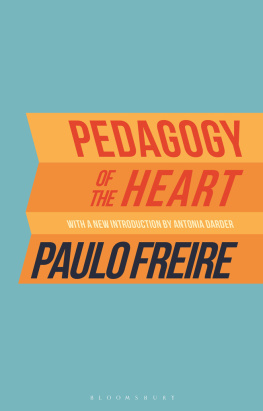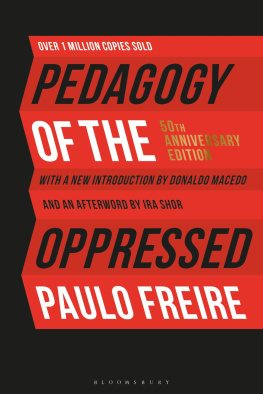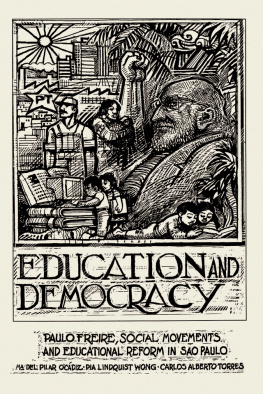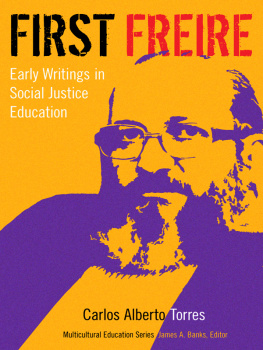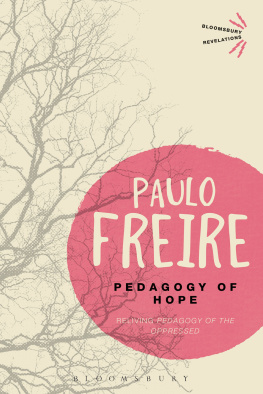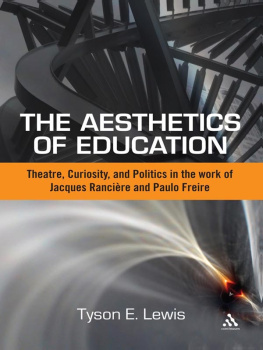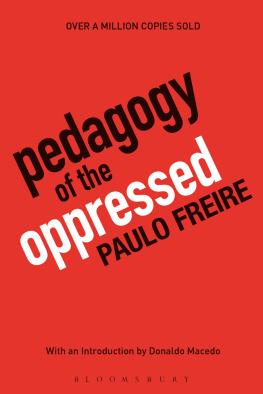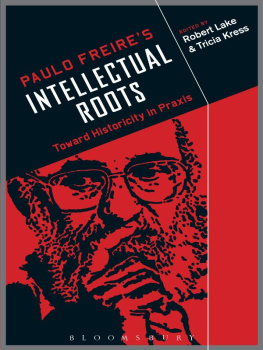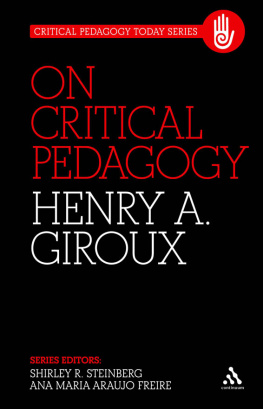2010 The University of North Carolina Press
All rights reserved
Manufactured in the United States of America
Set in Whitman and Fugu
The paper in this book meets the guidelines for permanence and durability of the Committee on Production Guidelines for Book Longevity of the Council on Library Resources.
The University of North Carolina Press has been a member of the Green Press Initiative since 2003.
Library of Congress Cataloging-in-Publication Data
Kirkendall, Andrew J.
Paulo Freire and the cold war politics of literacy / Andrew J. Kirkendall.
p. cm.
Includes bibliographical references and index.
ISBN 978-0-8078-3419-0 (cloth : alk. paper)
1. Freire, Paulo, 19211997. 2. LiteracyPolitical aspects.
3. LiteracyPolitical aspectsLatin America 4. Cold War. I. Title.
LB880.F732K57 2010
302.2'244dc22
2010006640
Portions of this work appeared previously in somewhat different form in Andrew J. Kirkendall, Entering History: Paulo Freire and the Politics of the Brazilian Northeast, 19581964, Luso-Brazilian Review 41:1 (Summer 2004): 16889; Andrew J. Kirkendall, Paulo Freire, Eduardo Frei, Literacy Training and the Politics of Consciousness Raising in Chile, 19641970, Journal of Latin American Studies 36:4 (November 2004): 687717; and Andrew J. Kirkendall, Paulo Freire, l'Unesco et la Lutte Contre l'Analphabtisme des Adultes dans le Monde de la Guerre Froide, 60 Ans d'Histoire de l'Unesco: Actes du Colloque International, Paris, 1618 Novembre 2005 (Paris: UNESCO, 2007). They are printed here with permission from the publishers.
14 13 12 11 10 5 4 3 2 1
Acknowledgments
My visits to the Instituto Paulo Freire in So Paulo were critical to the development of my ideas. I am not sure that the institute had ever had a foreign historian in their midst, and they seemed to have been intrigued by my insistence on squeezing the last drop out of their resources over several visits. My time spent reading in Freire's first personal library, which is located there, was particularly valuable. I am grateful to Moacir Gadotti and Angela Antunes for their encouragement and generosity. No one did more for me there than Lutgardes Costa Freire, Freire's youngest child. I am proud to consider him a friend. His letters also helped me gain access to materials at the Superior Tribunal Militar in Braslia, where, unfortunately, much that should be in Brazil's Arquivo Nacional is located. I have deposited copies of my copies at the institute. I thank him also for the use of photos. While I doubt that many at the institute will agree with a good deal of what I have written, I am extremely grateful for the warm welcome I have always received on my visits.
Waldemar Corts Carabantes and Jacques Chonchol were both kind enough to meet with me when I was doing research in Chile, although it should be clear that what I have written about them was based on documents and not on oral history interviews. The archives of the World Council of Churches in Geneva, Switzerland, have a wealth of material on Freire. Stephanie Knecht and Laurence Diehr allowed me to roam among the shelves and find things on my own. I am grateful for their trust.
In too many places where I did research, I was struck by the difficult conditions under which many archivists and librarians operate, particularly in northeastern Brazil. All treated me professionally, and I regret that I do not have the names of many who helped me in a matter-of-fact way and without ever suggesting that it was something that required special thanks. I fear that Paulo Santos at the state archives in Rio Grande do Norte in Natal will have to stand for those who go unnamed here. I must emphasize my debt to Gonalo Marcelino de Lira Neto of the military tribunal archives; Ana Paula of the Centro de Ensino Supletivo Virginia Correia de Oliveira in Recife; and Maria Joselita da Silva of the Instituto Nacional de Estudos e Pesquisas Educacionais Ansio Teixeira in Braslia. Marclia Gama helped me with the political police records for the state of Pernambuco; unfortunately, the file on Freire himself has gone missing. Thanks as well to Margarita Vannini and the exceptional staff of the Universidad Centroamericana's Instituto de Historia de Nicaragua y Centroamrica in Managua. My involvement with the UNESCO historical conference in 2005 grew out of my research in Paris in the UNESCO archives in 2004; many thanks to archivists Jens Boel and Mahmood Ghander for their support.
In the United States I want to thank David Kuzma of the Special Collections and University Archives at Rutgers University, Stephen Plotkin of the John F. Kennedy Library, and Regina Greenwell of the Lyndon Baines Johnson Library. I am also grateful to the interlibrary loan department of Evans Library at Texas A&M University.
Other people who helped in a variety of small but important ways include Justin Wolfe, Emily Story, Caitlin Fitz, Jim Green, Jeff Lesser, Barbara Weinstein, ric Morier-Genoud, Maria Escobar-Lemmon, Celso Castilho, Steven Kyle, Renato Aguilar, and Lesley Bartlett. Special thanks to Mary Ann Mahony, who got me started writing on this project early.
Thanks also to Celia Barlow, the Journal of Latin American Studies, and Cambridge University Press; the Luso-Brazilian Review and the University of Wisconsin Press; and UNESCO for permission to reproduce material that originally appeared in their publications. Thanks in particular to the anonymous reviewers for JLAS for their suggestions.
I thank the Texas A&M College of Liberal Arts for a faculty research enhancement award that financed the first research trip on this project back in 2001, and for helping to defray some of the production costs. I also thank the history department and the Glasscock Center for Humanities Research for supporting me with small research grants over the years. I thank department head Walter Buenger for supporting my leave of absence. Thanks, as always, to Jude Swank for help with the computer, Barbara Dawson for help with reimbursements, and to Judy Mattson, who has provided invaluable help for years. Thanks to Jude, Judy, Robyn Konrad, and Rita Walker as well for lending sympathetic ears in difficult times.
My career would have been very different had it not been for the efforts of my colleagues Terry Anderson, Al Broussard, and Chester Dunning. Their rare example of solidarity and bravery when an injustice was being done is much appreciated and it is a reason why I find so much of the resistance literature ultimately unsatisfying. I hope they know how much I value them.
Other colleagues have helped in other ways: Jim Bradford for his truly encyclopedic knowledge; Hank Schmidt for his inspiring example of pioneering cultural historical scholarship; and R. J. Q. Adams, Chuck Brooks, Jeff and Kate Cart Engel, Rebecca Schloss, Roger Reese, Glenn Chambers, Jason Parker, Robert Resch, Molly Warsh, John Lenihan, Chip Dawson, David Hudson, and others in the department already named for general camaraderie. Those colleagues who were not yet tenured back in 20023 also provided thoughtful commentary on the project early on, and I appreciate it.
I thank my editor, Elaine Maisner, the manuscript's anonymous reviewers, Tema Larter, Mary Caviness, and all of the other good folks at the University of North Carolina Press for helping make this a book. I hope that the anonymous readers for the press know how much I appreciated their professional and close readings. I alone am to blame should errors remain.


